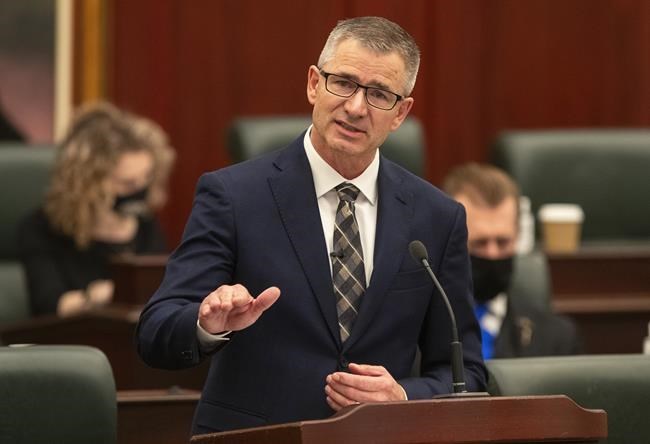EDMONTON — New numbers show Alberta's bottom line is on track to look better this fiscal year, but the province remains mired in a deep ditch of red ink as it battles a resurgence of COVID-19.
Finance Minister Travis Toews said Tuesday that this year's deficit is projected to be $7.8 billion, less than half of the $18.2 billion projected in the 2021-22 budget in February.
He said benchmarks such as GDP projections, consumer spending, exports and housing starts are all far above projections made six months ago.
"Economic growth is exceeding our expectations," Toews told reporters.
The government credits the turnaround to an ongoing economic recovery from COVID-19, along with a rebound in the energy sector and price restraint by the oil cartel OPEC.
"Global demand for oil has outstripped supply, meaning oil prices are stronger than expected," said Toews.
West Texas Intermediate, the benchmark price for oil, was expected to fetch US$46 a barrel in the budget, but has been rising sharply and is expected to average more than US$65 a barrel this year.
Alberta's non-renewable resource revenue is now forecast at almost $10 billion, which is $7 billion more than first projected in February.
The overall revenue forecast is $55 billion, about $11 billion more than expected.
Total expense is now pegged at $62.7 billion. That's almost $1 billion more than planned, due mainly to anticipated crop insurance payouts caused by extreme drought this summer.
Toews reiterated there would be a plan to balance the books after COVID, but in the meantime, taxpayer-supported debt is projected to reach nearly $106 billion by next March, with debt interest payments pegged at $2.6 billion.
Toews said the government will keep trying to find savings — including a proposal to cut wages for nurses now bargaining for a new collective agreement.
The economic improvement comes as Alberta battles a steep rise in COVID-19 cases linked to the more contagious Delta variant.
There were a thousand new cases a day reported last week, but that number dropped slightly on the weekend and was at 920 on Tuesday. There were 431 people in hospital with COVID, 106 of whom were in intensive care.Â
Premier Jason Kenney’s government lifted almost all health restrictions two months ago and Kenney, chief medical officer Dr. Deena Hinshaw and Health Minister Tyler Shandro have not spoken to reporters for weeks to address whether anything would be done on the rising case rates.
In their absence, municipal, business and education leaders have moved on their own, implementing a patchwork quilt of masking, testing and vaccination rules.
Toews challenged reporters who suggested the province is failing to lead through the pandemic, noting officials have issued statements and social media updates as required.
"We have not kept anybody in the dark," he said.
As for the economy, he said: "We've factored in the issue of the pandemic.
"It's been expected that the fourth wave is going to be a bit bumpy."
The Opposition NDP said Toews can't take credit for an economic rebound based on the ups and downs of global oil prices, and said that any continued economic recovery depends on a robust, responsible strategy to deal with the COVID surge.
"The government has flatly abandoned Albertans at a time when the fourth wave of COVID-19 is larger than they ever warned it would be," said NDP jobs critic Deron Bilous.
"They've abandoned us as uptake of life-saving vaccines has levelled off and Alberta is amongst the worst in the country in this regard.
"If the finance minister can't level with Albertans about his government's horrendous mishandling of this pandemic, we can't take him at his word about this government's so-called economic plan, either."
This report by The Canadian Press was first published Aug. 31, 2021.
Dean Bennett, The Canadian Press

